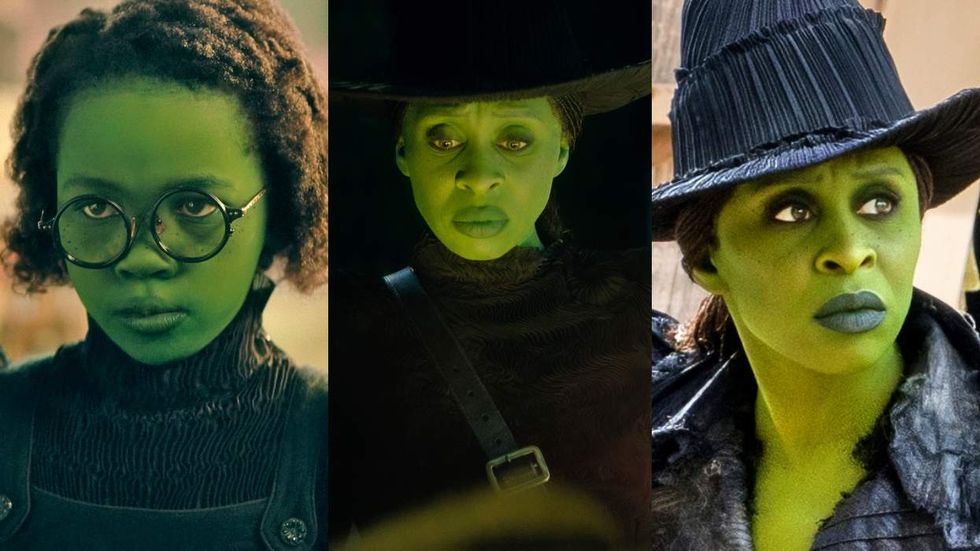
WWW.OUT.COM
Elphie: How a gay authors relationship with his father inspired a Wicked witch
Three decades later, Gregory Maguires 1995 Wicked novel is more urgent than ever. After a triumphant run on Broadway, the first Wicked movie adaptation was a huge critical and commercial hit; the highly anticipated Wicked: For Good sequel comes out soon; and the out author published a new book earlier this year, Elphie: A Wicked Childhood, which explores what happens during the time jump of the original novel (which depicts Elphaba Thropp as a baby, and then as an adult).In many ways, Maguires 2025 novel Elphie is a prequel to 1995s Wicked novel, which was already an unofficial prequel to the 1900s The Wonderful Wizard of Oz saga by L. Frank Baum. That brings up the question: Why revisit this story now, 30 years later, through writing a new prequel-within-a-prequel?A line in William Wordsworths poem, My Heart Leaps Up, is one of Maguires biggest inspirations for writing Elphie: The Child is father of the Man.You cant really know how somebody gets to be powerful if you dont know what happened to them as kids, Maguire tells Out. I wanted to strengthen and deepen the complexity, and nature, of the relationships within Elphabas family. The cover art of Gregory Maguires 2025 novel Elphie: A Wicked Childhood; Gregory Maguire, author, poses for a photo.Willam Morrow; Helen Maguire NewmanIn the Elphie and Wicked novels, Elphaba has a pious father (figure), Frexspar; a bored and horny mother, Melena; and a holier-than-thou younger sister, Nessarose. Eventually, Elphaba also gains a scoundrel younger brother named Shell, who isnt in the musical nor in the film adaptations of the story.The author draws a parallel between Elphie and finding a box of family photos under the stairs. A younger person might look at those photos and think, These scowling people in brown or black-and-white old photos. Theyre so ugly, no wonder they died, Maguire says, chuckling. But after growing older and having more life experiences, Maguire argues that a person can look at those photos with a different perspective.You begin to see the humanity in their frozen faces and rigid backbones. You begin to have some sympathy for them, the novelist muses. You need to have lived quite a lot more to be able to lend sympathy backwards to those who raised you, and punished you, and did you a disservice But who are also just humans.Maguire explains that the Elphie novel doesnt spend too much time with Frexspar Thropp, Elphabas assumed father, because he was already an annoying, but rounded character in the original Wicked book.But I do think Melena Maguire pauses. So close to Melania Melena. He adds, I wouldnt say Ive tried to rehabilitate Melena. I just tried to see her more clearly. Courtney Mae-Briggs as Melena Thropp in Wicked.Universal PicturesIn the Wicked novels, Frexspar is not the governor of Munchkinland. Hes a religious missionary and a very unsuccessful one. In internet-speak, stans would give Frexspar a full chop, and would call him a total flop.Elphabas father, best known as Frexspar the Godly in the books, is a deeply religious man who dedicates his entire life to serving the Unnamed God. But heres the thing: No one cares. Ozians have found love and faith in the Wizard, so no one is interested in hearing about this so-last-season Unnamed God pushed by Frexspar.Frexspar tries very hard, every single day of his life, to stand for what he believes in. This comes at a great cost, and leads him to become a very isolated person who refuses to stop doing his work as a missionary and as a preacher.Does the last paragraph sound a little bit familiar? Lets discuss it. Andy Nyman as Frexspar, Cynthia Erivo as Elphaba in Wicked.Universal PicturesI cautiously tell Maguire about a parallel that Ive identified from consuming a lot of Wicked content over the years. Elphaba grew up with a mother like Melena, who constantly cheated on her husband, abused substances, and taught Elphaba how volatile the concept of trust can be.Its even more interesting to think about what Elphaba mustve learned from her father, Frexspar, when comparing the course of their lives. In the books, Elphaba spends her entire childhood seeing how terrible it is for her father to keep pushing his strong beliefs that no one else seems to clock, respect, or even understand. A set of core beliefs most of which are intended to be positive and do good that no one else seems to even notice. They were looking at, or listening to, something else.I ask Maguire if he also sees these parallels between Elphaba and Frexspar: Two people who feel very strongly about what they believe in, experience how Ozians do not care about their causes, and go on to live very isolated lives as a result. Dying on a hill that no one even realized was there.Thats very astutely observed. I really appreciate it, Bernardo, Maguire says. Cynthia Erivo as Elphaba flying over Oz in Wicked: For Good.Universal PicturesIf people read Wicked the novel a little closely, Maguire adds, theyll know that Elphaba could sing before she became a musical comedy sensation. (For context, the original Wicked novel was published in 1995, and the Wicked musical on Broadway only premiered in 2003.)It was very important to Maguire even in the process of the writing the Wicked novel that Elphaba wasnt rendered musically voiceless.I have many happy memories of my father, whos been long dead almost 40 years and I have some unhappy memories of him too, the author reflects. He wasnt really comfortable with my being gay. He wasnt really comfortable that I was a happy person. The family atmosphere was kind of morbid after his wife died and I was born. My mother died in childbirth when I was born.Maguire says that his father simply did not take to me. The father had six other children instead. I was the unhappy linchpin in our family of nine people because, had I not shown up, maybe his wife wouldve lived, the Wicked creator highlights. Cynthia Erivo as Elphaba in Wicked.Universal PicturesMaguire brings up the analogy of Elphaba and her father and compares it to his own experiences with his own father. Elphaba, too, may have wanted to revolve 180 degrees from what her father represented from the shame, the disgrace, the mocking. But she couldnt shed his influence.But who can? the author asks. We cant shed the influence of our parents. So, when Elphaba takes up a lost cause, or what looks like a lost cause, it really is not much different from what her fathers done. Its directed a different way, but she has similar tenacity, similar drive, and she keeps going even when it looks like shes not going to make it.Elphabas story is a tragedy in Wicked, the novel. And its a tragedy partly because she cannot fulfill her aims, Maguire says. My story is not a tragedy. I found a way to fulfill my aims. Gregory Maguire at the Empire State Book Festival in April 2010.Times Union/Michael P. Farrell via Getty ImagesI ask Maguire, an out gay man for several decades now, if he has any advice for the LGBTQ+ community going through these difficult times.Oh, absolutely, he replies, enthusiastically. I think were in the age of the anti-hero, which began sort of in the 50s with Holden Caulfield [of The Catcher in the Rye] and The Man in the Gray Flannel Suit, and continued in the 70s with Dirty Harry and Bonnie and Clyde. Those were people who were celebrated for being bad, breaking convention, and doing things that were dangerous and unfortunate for others not caring, and then being cheered for it.Maguire adds, And thats exactly where we live in 2025: The break everything before it can do any good syndrome.Generally, Maguire argues that weve lost sight on what was, for so many decades, or centuries even, this belief that you can select someone whom you admire and hold them in your heart for inspiration. A poster that reads, Glinda the Good, across a poster that reads, The Wicked Witch, in the Emerald City, as seen in Wicked: For Good.Universal PicturesMaguire references both the Hallelujah singer Leonard Cohen and Where the Wild Things Are author Maurice Sendak, as his two muses in the actual process of writing. Ive got about eight Sendak originals in the house that Ive bought through the course of my career, he reveals. The idea of having a person in your mind and in your heart as your musethat, to me, was very useful.(In October 2009, Maguire wrote an op-ed for Out in which he exalted Maurice Sendaks Where the Wild Things Are and discussed the overall importance and challenges of childrens literature.)As our profound and inspiring conversation nears its end, Maguire breaks down how three of his biggest muses contributed to the creation of Elphaba as we know her to be in the original Wicked book, on the hit Broadway musical, in the two-part cinematic saga directed by Jon M. Chu, and in his latest novel, Elphie, too.Laura Nyro is Elphaba when she goes to college: Long hair, and a three-octave range, and this passionate sizzling capacity to put an idea over. Virginia Woolf is my muse for Elphaba in what amounts to her middle age, because shes intellectual, and argumentative, and has been left out. Virginia Woolf did not go to college like her brother and made contributions anyway that far exceed those of the rest of her family. And Emily Dickinson, toward the end of her life, who retired up the back stairs, and up the stairs into her bedroom would only address visitors to her through the chink in the door, when the door was partly open. They would bring a chair up in the hall and she would talk to them through the door. Elphaba, in the [Kiamo Ko] castle, is Emily Dickinson in her room. Those three women were my muses, and because they were my muses, each of them lent something to the construction of the character of Elphaba.Gregory Maguire's Elphie: A Wicked Childhood is available for purchase everywhere books are sold. The audiobook version of the book, narrated by Wicked actress Cynthia Erivo, is also available on all online audiobook stores. Wicked: For Good opens in theaters on November 21. See on Instagram
0 Comments
0 Shares
76 Views
0 Reviews



